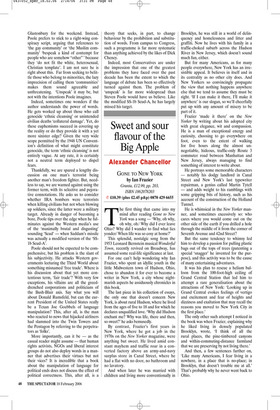Sweet and sour flavour of the Big Apple
Alexander Chancellor
GONE TO NEW YORK by Ian Frazier Granta, £12.99, pp. 203, ISBN 1862078203 ✆ £10.39 (plus £2.45 p&p) 0870 429 6655 The first thing that came into my mind after reading Gone to New York was a song — ‘Why, oh why, oh why, oh/ Why did I ever leave Ohio? Why did I wander to find what lies yonder/ When life was so cosy at home?’ This splendid, nostalgic song from the 1953 Leonard Bernstein musical Wonderful Town, recently revived on Broadway, has assumed some real-life significance at last.
For one can’t help wondering why Ian Frazier, who spent an idyllic youth in the little Midwestern town of Hudson, Ohio, chose to abandon it for ever to become a writer in New York, a city whose nightmarish aspects he assiduously chronicles in this book.
The last piece in his collection of essays, the only one that doesn’t concern New York, is about rural Hudson, where he lived from the ages of five to 18 and for which he declares unqualified love. ‘Why did Hudson enchant me? Why was life, there and then, so sweet?’ he asks bemusedly.
By contrast, Frazier’s first years in New York, where he got a job in the 1970s on the New Yorker magazine, were anything but sweet. He lived amid constant mayhem and traffic roar in a converted factory above an army-and-navy surplus store in Canal Street, where he had a flat with no door, no bathroom and no lavatory.
And when later he was married with children and living more conventionally in Brooklyn, he was still in a world of delinquency and homelessness and litter and graffiti. Now he lives with his family in a traffic-choked suburb across the Hudson River in New Jersey, which doesn’t sound much fun, either.
But for many Americans, as for many people everywhere, New York has an irresistible appeal. It believes in itself and in its centrality as no other city does. And New Yorkers so convincingly propagate the view that nothing happens anywhere else that we tend to assume they must be right. ‘If I can make it there, I’ll make it anywhere’ is our slogan, so we’ll cheerfully put up with any amount of misery to be part of it.
Frazier ‘made it there’ on the New Yorker by writing about his adopted city with great elegance, wit and compassion. He is a man of exceptional energy and curiosity, choosing to go everywhere on foot, even to the extent of walking for five hours along the almost unnegotiable, hideous, traffic-only Route 3 commuter road between Manhattan and New Jersey, always managing to find something of interest to write about.
He portrays some memorable characters — notably his dodgy landlord in Canal Street and New York’s last typewriter repairman, a genius called Martin Tytell — and adds weight to his ramblings with some gripping bits of history, such as his account of the construction of the Holland Tunnel.
He is whimsical in the New Yorker manner, and sometimes excessively so: who cares where you would come out on the other side of the earth if you drilled a hole through the middle of it from the corner of Seventh Avenue and 42nd Street?
But the same tendency to whimsy led him to develop a passion for pulling plastic bags out of the tops of trees (patenting a special ‘snagger’ he invented for the purpose), and this activity was to be the cause of many entertaining adventures.
It was his plan to rescue a helium balloon from the 100-foot-high ceiling of Grand Central Station that led him to attempt a rare generalisation about the attractions of New York: ‘Looking up in Grand Central evokes feelings of vertigo and excitement and fear of heights and dizziness and exaltation that may recall the reasons you moved to New York City in the first place.’ The only other such attempt I noticed in the book was when Frazier, explaining why he liked living in densely populated Brooklyn, wrote, ‘I think of all the rural places, the pine-timbered canyons and within-commuting-distance farmland that we are preserving by not living there.’ And then, a few sentences further on, ‘Like many Americans, I fear living in a nowhere, in a place that is no-place; in Brooklyn, that doesn’t trouble me at all.’ That’s probably why he never went back to Ohio.


















































































 Previous page
Previous page